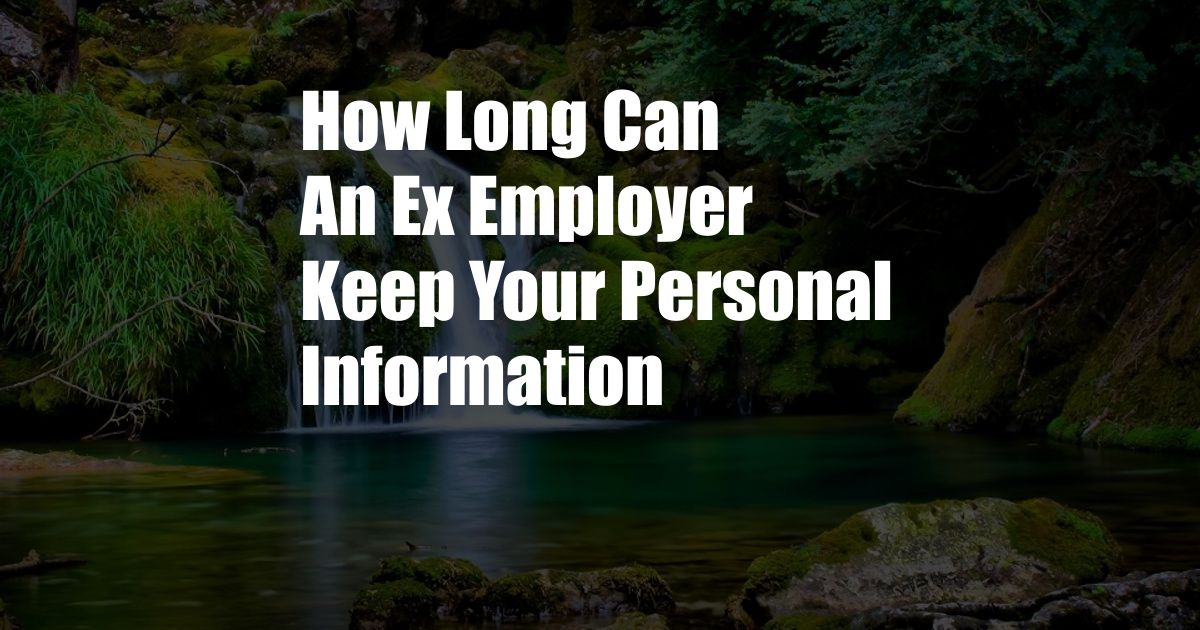
How Long Can an Ex-Employer Keep Your Personal Information?
Staring at the dreaded letter, I felt a cold sweat trickling down my spine. “We regret to inform you,” it read. My heart sank as I realized my journey at the company had come to an end. Amidst the whirlwind of emotions, a nagging question arose: what would happen to my personal information? In this article, we’ll delve into the intricate web of laws and regulations governing how long ex-employers can retain your personal data.
Your Personal Information: A Legal Minefield
The moment you sign an employment contract, you entrust your ex-employer with sensitive information, including your:
- Social Security number
- Date of birth
- Address
- Phone number
- Health records
- Bank details
Protecting this data is paramount, and various laws regulate its handling and disposal.
Understanding the Legal Framework
The retention period for employee data varies depending on the type of information and the applicable laws. Federal regulations, such as the Fair Credit Reporting Act (FCRA) and the Health Insurance Portability and Accountability Act (HIPAA), mandate specific disposal timelines for certain categories of personal data.
a) Background Check Information
Under the FCRA, background check companies are required to dispose of the information they collect within a specific timeframe. This typically includes consumer reports, such as credit checks and criminal background checks, which must be destroyed within five years of the date the report was issued.
b) Medical Records
HIPAA requires healthcare providers, including employers, to retain medical records for a minimum of six years after the date of the last treatment or service. However, employers may choose to retain medical records for a longer period for insurance purposes or to comply with state laws.
c) Social Security Numbers
The Social Security Administration (SSA) recommends that employers destroy Social Security numbers (SSNs) when they are no longer needed for business purposes. However, the SSA does not mandate a specific retention period for SSNs, so employers should refer to their own internal policies or applicable state laws.
General Retention Guidelines
In the absence of specific legal requirements, employers should adhere to general retention guidelines for personal data. These include:
- Keep only what you need: Determine the minimum amount of personal data necessary for business purposes and dispose of any unnecessary information.
- Establish clear retention policies: Document the retention period for each type of personal data and ensure compliance with these policies.
- Dispose of data securely: Shredding, incineration, or electronic deletion are acceptable methods for secure disposal of personal data.
Employer Responsibilities
Ex-employers have a legal and ethical responsibility to protect the personal information of former employees. This includes:
- Providing notice: When terminating employment, employers should notify former employees about the retention and disposal of their personal data.
- Respecting employee rights: Ex-employees have the right to access and amend their personal data and request its deletion in certain circumstances.
- Complying with data protection regulations: Employers must comply with all applicable data protection laws and regulations, both federal and state.
Staying Informed and Taking Action
The laws and regulations governing the retention of personal data are constantly evolving. Employers should stay informed about the latest updates to ensure compliance and protect the privacy of former employees. Former employees should also be aware of their rights under the law and take proactive steps to protect their personal information.
Frequently Asked Questions
Q: How long can my ex-employer keep my medical records?
A: HIPAA requires healthcare providers to retain medical records for at least six years after the date of the last treatment or service.
Q: Do I have the right to access my personal data held by my ex-employer?
A: Yes, under most data protection laws, you have the right to access and amend your personal data, including information held by your ex-employer.
Q: Can I request that my ex-employer delete my personal data?
A: In some cases, you may have the right to request that your ex-employer delete your personal data. However, this right is not absolute and depends on the circumstances and applicable laws.
Conclusion
The retention of personal information by ex-employers is a complex legal issue that requires a delicate balance between protecting privacy rights and complying with business and regulatory requirements. By understanding the laws and guidelines governing data retention, both employers and former employees can ensure that personal data is handled responsibly and securely. Are you concerned about the retention of your personal data by your ex-employer? Leave a comment below and let’s discuss the issue further.